
Som Chatterjee
Research Interests
Our laboratory is interested in the mechanistic understanding of the fundamental biological principles that lead to antibiotic resistance and tolerance in Staphylococcus aureus with a particular focus on bacterial cell wall reactive antibiotics. S. aureus is an important human bacterial pathogen that causes broad-spectrum of diseases in humans and economically important animals and is responsible for causing high morbidity and mortality worldwide. The goal of our lab is to better understand the biology of antibiotic resistance/tolerance with the overarching goal of improving human health by finding novel targets for bacterial intervention and discovering novel biomarkers for diagnosing resistant S. aureus strains. We use a wide variety of molecular, biochemical, immunological, proteomic and genomicapproaches to decipher our research questions.
During the course of the past few years, our research has identified several interesting and novel pathways that are involved in antibiotic resistance and tolerance in S. aureus. Studying these novel pathways will decipher their role/s in the antibiotic resistance/tolerance process. Moreover, our work will elucidate various unknown aspects of basic biology, such as bacterial cell signaling, gene regulation and protein-protein interactions, which are crucial for bacterial resistance/tolerance. Our lab pursues every project with the mindset of utmost rigor and with a mentality of digging deep. In addition to antibiotic resistance and tolerance, our lab’s research interests are as follows: staphylococcal persistence, staphylococcal biology, and staphylococcal host-parasite interactions.
We are always looking for motivated and collegial individuals to be a part of our lab. If you are interested in our research questions please contact schatterjee@umaryland.edu with your CV and a statement explaining why you would like to work in our group.
About the Principal Investigator:
Dr. Chatterjee received his master’s degree from the Department of Biophysics and Molecular Biology, University of Kolkata (Calcutta), India. He then went on to perform his doctoral studies in the laboratory of Dr. Trinad Chakraborty in Justus-Liebig University, Germany where he studied the infection process of Listeria monocytogenes, an intracellular pathogen that is responsible for causing food-borne illnesses.
After completing his PhD, he joined Dr. Michael Otto’s group at the National Institutes of Health (NIH) to study the secretion process of a group of cytolytic peptide toxins called Phenol Soluble Modulins (PSMs) in S. aureus. In 2014, Dr. Chatterjee joined Dr. Henry Chambers’ group at University of California, San Francisco (UCSF) to study the major public health problem of antimicrobial resistance in S. aureus. In 2015, he became an Assistant Adjunct Professor at UCSF.
In January of 2019, Dr. Chatterjee joined the faculty at the University of Maryland, Baltimore. He is a member of the UMB School of Dentistry Department of Microbial Pathogenesis. He is currently based at the Institute of Marine and Environmental Technology (IMET), where he continues to investigate antimicrobial resistance in S. aureus. Research in the Chatterjee lab is funded through grants from the National Institutes of Health (R01 and R21) and through University Systems of Maryland (seed funding).
Publications (selected):
Lai L-Y, Satishkumar N, Cardozo S, Hemmadi V, Marques LB, Huang L, Filipe SR, Pinho MG, Chambers HF, Chatterjee SS. Altered PBP4 and GdpP functions synergistically mediate MRSA-like high-level, broad-spectrum β-lactam resistance in Staphylococcus aureus. mBio. 2024 May 8;15(5):e0288923. doi: 10.1128/mbio.02889-23. Epub 2024 Mar 26. PMID: 38530033; PMCID: PMC11077961.
(Commentary: Gardner TM and Grosser MR. A MRSA mystery: how PBP4 and cyclic-di-AMP join forces against β-lactam antibiotics. mBio. 2024 Jul 19:e0121024. doi: 10.1128/mbio.01210-24. Online ahead of print.)
Alexander JAN, Worrall LJ, Hu J, Vuckovic M, Satishkumar N, Poon R, Sobhanifar S, Rosell FI, Jenkins J, Chiang D, Mosimann WA, Chambers HF, Paetzel M, Chatterjee SS, Strynadka NCJ. Structural basis of broad-spectrum β-lactam resistance in Staphylococcus aureus. Nature. 2023 Jan;613(7943):375-382. doi: 10.1038/s41586-022-05583-3. Epub 2023 Jan 4. PMID: 36599987; PMCID: PMC9834060.
Satishkumar N, Lai LY, Mukkayyan N, Vogel BE, Chatterjee SS. A Nonclassical Mechanism of β-Lactam Resistance in Methicillin-Resistant Staphylococcus aureus and Its Effect on Virulence. Microbiol Spectr. 2022 Dec 21;10(6):e0228422. doi: 10.1128/spectrum.02284-22. Epub 2022 Oct 31. PMID: 36314912; PMCID: PMC9769611.
Mukkayyan N, Poon R, Sander PN, Lai LY, Zubair-Nizami Z, Hammond MC, Chatterjee SS. In Vivo Detection of Cyclic-di-AMP in Staphylococcus aureus. ACS Omega. 2022 Aug 26;7(36):32749-32753. doi: 10.1021/acsomega.2c04538. PMID: 36120079; PMCID: PMC9476191.
Poon R, Basuino L, Satishkumar N, Chatterjee A, Mukkayyan N, Buggeln E, Huang L, Nair V, Argudín MA, Datta SK, Chambers HF, Chatterjee SS. Loss of GdpP Function in Staphylococcus aureus Leads to β-Lactam Tolerance and Enhanced Evolution of β-Lactam Resistance. Antimicrob Agents Chemother. 2022 Feb 15;66(2):e0143121. doi: 10.1128/AAC.01431-21. Epub 2021 Nov 29. PMID: 34843389; PMCID: PMC8846394.
Satishkumar N, Alexander JAN, Poon R, Buggeln E, Argudín MA, Strynadka NCJ, Chatterjee SS. PBP4-mediated β-lactam resistance among clinical strains of Staphylococcus aureus. J Antimicrob Chemother.2021 Aug 12;76(9):2268-2272. doi: 10.1093/jac/dkab201. PMID: 34151961; PMCID: PMC8633438.
Chatterjee A, Poon R, Chatterjee SS. Stp1 Loss of Function Promotes β-Lactam Resistance in Staphylococcus aureus That Is Independent of Classical Genes. Antimicrob Agents Chemother. 2020 May 21;64(6):e02222-19. doi: 10.1128/AAC.02222-19. PMID: 32179529; PMCID: PMC7269480.
Talks and News:
a) Chatterjee Lab public lecture:
b) UMSOD Featuring on Chatterjee Lab:
About the Lab Members:
Soo-Kyoung Kim,Ph.D.

Soo-Kyoung Kim received Ph. D. in South Korea and moved to the United States in 2017 to conduct postdoctoral research at the University of Maryland, College Park. She had focused on bacterial RNA degradation regulatory mechanisms, the identification of alginate-inhibiting compounds, and investigated their mechanisms in P. aeruginosa. In 2025, she joined Dr. Chatterjee’s lab, where she investigates the role of PBP4 overexpression on S. aureus’ physiology.
Raymond Poon, B.S.
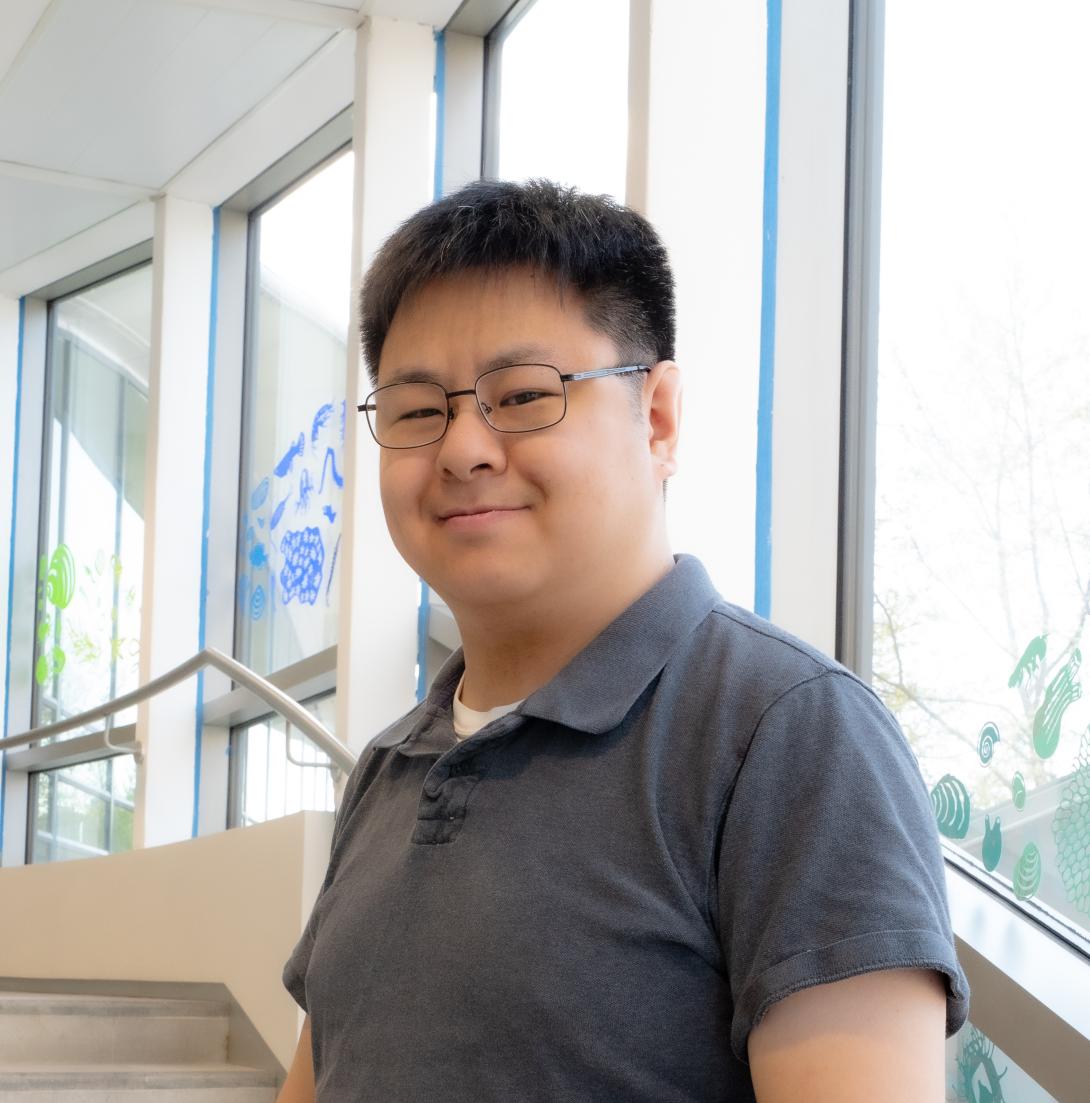
Raymond graduated from the University of California, Berkeley with an undergraduate degree in Molecular and Cellular Biology and a concentration in Immunology. After completing his degree, he interned for two semesters in a program called “Bridge to Biotechnology” through City College of San Francisco. In 2018, he began to work in Dr. Chatterjee’s lab at the University of California, San Francisco, and in 2019, he relocated to Baltimore, Maryland where he continues his research. As of 2024, Raymond started his Master’s program as a part-time student in Marine Estuarine Environmental Sciences (MEES) program at the University of Maryland, Baltimore. He supports all ongoing research efforts in the lab.
Swagata Bose, PhD.

Swagata earned her PhD in August 2023 from the Institute of Life Sciences, Bhubaneswar, India, under the mentorship of Dr. Narottam Acharya. Her research focused on polymicrobial interactions among Staphylococcus aureus, E. coli, and Candida albicans, simulating the human gut environment, and she successfully developed a live whole-cell vaccine against systemic candidiasis. In May 2024, she joined Dr. Chatterjee’s lab as a postdoctoral research fellow, where her work explores the role of serine-threonine kinase signaling in Staphylococcus aureus.
Vedangi Hayatnagarkar, M.S., M. Tech.

Vedangi is a PhD student in Dr. Chatterjee’s lab. Her research focuses on investigating the role of cyclic-di-AMP (CDA), a newly identified second messenger, in causing antibiotic tolerance in Staphylococcus aureus.
Lab Alumni:
Nidhi Satishkumar, PhD Image:
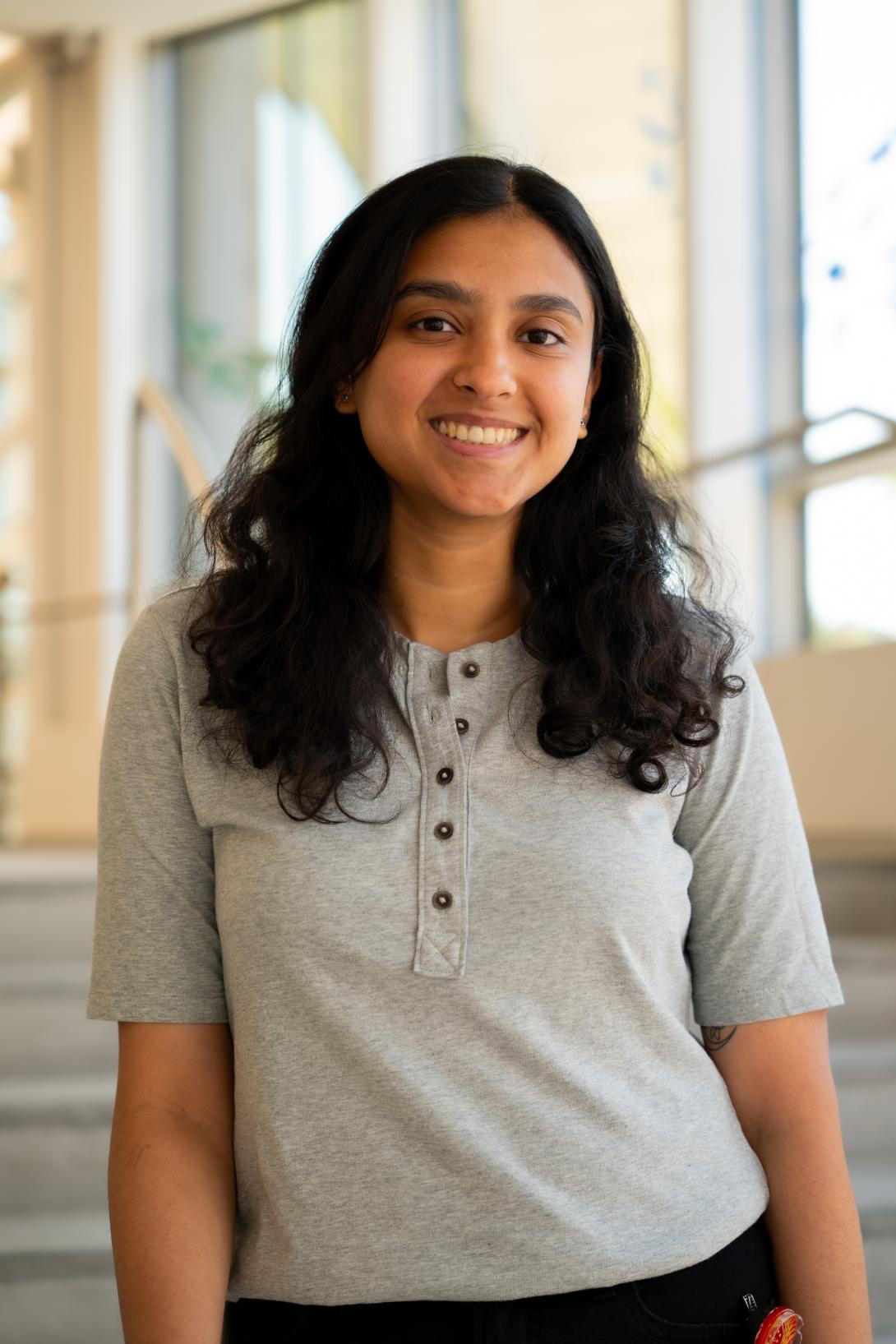
|
Li-Yin Lai, Ph.D. Image:
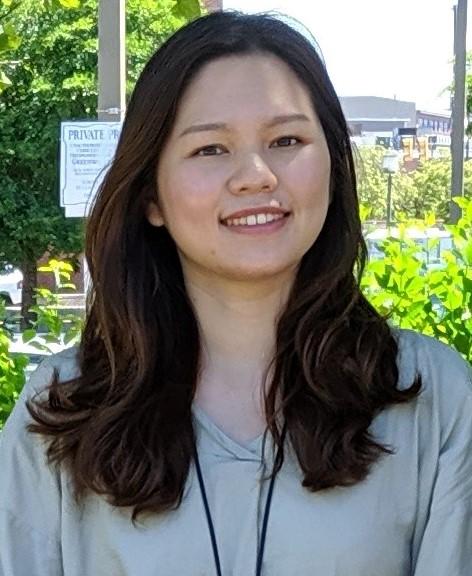
|
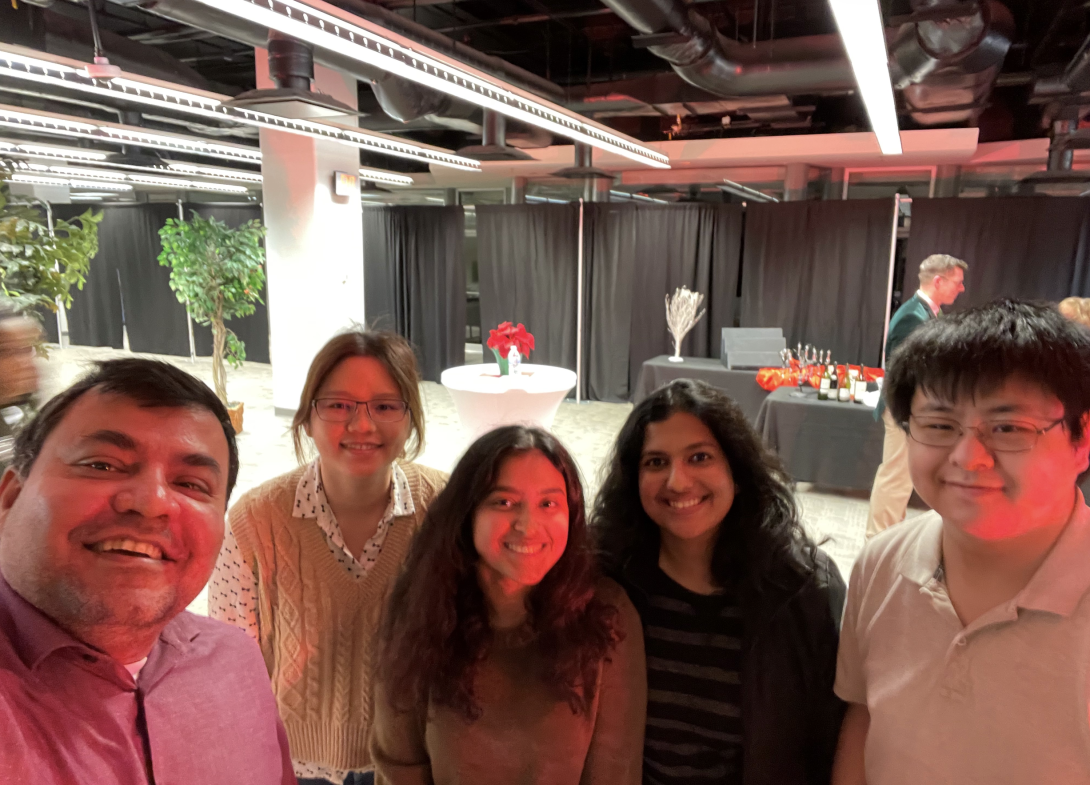
Chatterjee Lab, 2022 (From left: Som Chatterjee, Li-Yin Lai, Nidhi Satishkumar, Sasha Cardozo, Raymond Poon; not pictured: Stephanie Wilson)
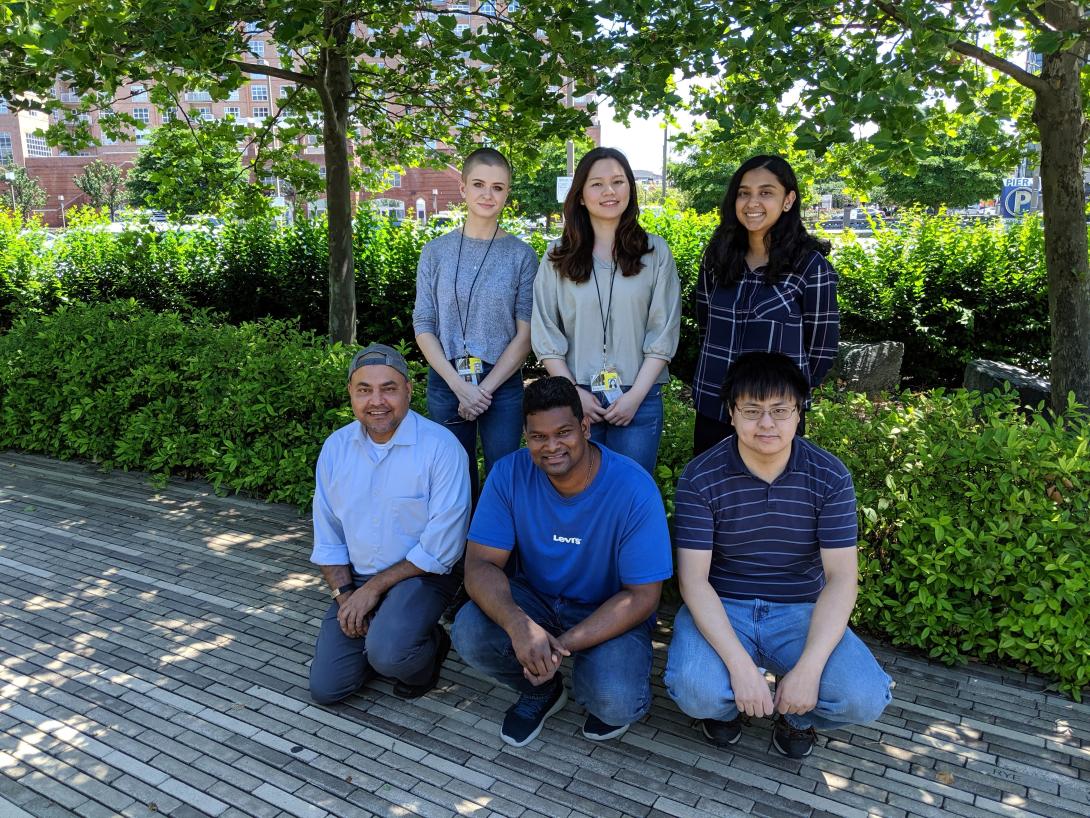
Chatterjee Lab, 2021 (Top from left: Breanna Shirtliff, Li-Yin Lai, Nidhi Satishkumar; Bottom from left: Som Chatterjee, Nagaraja Mukkayyan, Raymond Poon)
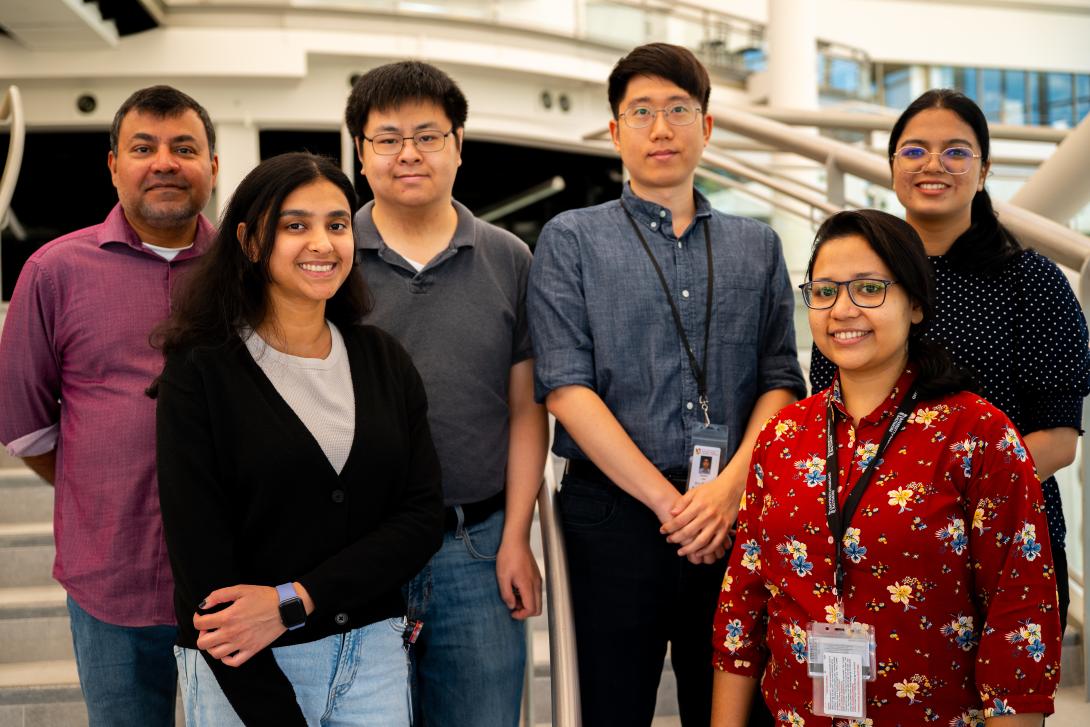
Chatterjee Lab, 2024 (From Left: Som Chatterjee, Nidhi Satishkumar, Raymond Poon, Hanbin Lee, Swagata Bose, Vedangi Hayatnagarkar )




